May 22, 2025 | 12:02 GMT +7
May 22, 2025 | 12:02 GMT +7
Hotline: 0913.378.918
May 22, 2025 | 12:02 GMT +7
Hotline: 0913.378.918
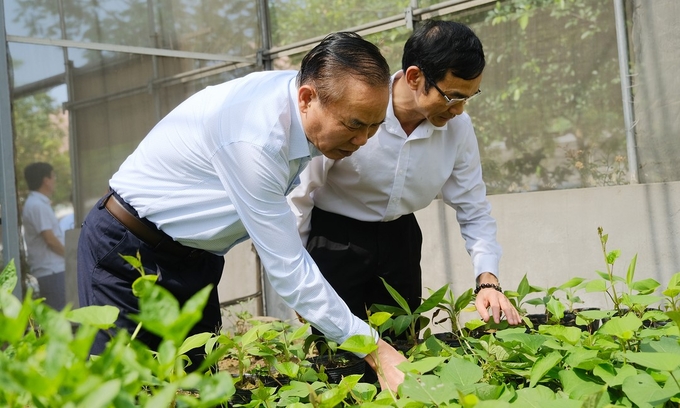
Deputy Minister Phung Duc Tien and Deputy Director of the Plant Protection Research Institute Trinh Xuan Hoat visit the net house model. Photo: Bao Thang.
Reporting to the delegation of the Ministry of Agriculture and Rural Development visiting and working on May 6, Director of the Plant Protection Research Institute Nguyen Van Liem said that the Institute always proactively gets ahead of diseases on crops, especially the tasks of rice research.
In response to the current outbreak of Meloidogyne incognita on rice, which is emerging in some provinces, PPRI has urgently collected and assessed samples and is conducting research to effectively control this pest.
At the same time, PPRI has identified two species of natural enemies that play a big role in restraining and controlling the corn-damaged fall armyworm, which are Euborellia annulipes of the order Dermaptera and the parasitic fungus Nomuraea riley (Hypocreales: Clavicipitaceae).
With citrus fruit trees, a strong research area of PPRI, for many years the Institute has conducted in-depth research on the disease prevention of Greening, Tristera, scabies, orange scar, and restoration of the precious local pomelo, orange, and mandarin seeds such as Trung Vuong orange, Ha Tri mandarin, Phuc Trach pomelo, etc.
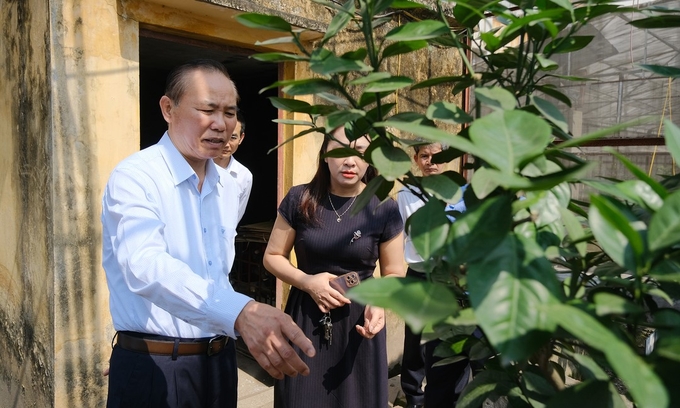
The PPRI’s elite orchard contains many precious seeds in regions across the country. Photo: Bao Thang.
Deputy Director Nguyen Thi Bich Ngoc said that the Institute’s research results on the causes of orange yellow leaf and root rot disease caused by a complex of agents including fungi, Meloidogyne incognita, and mealybugs contributed to the successful orange re-cultivation in some localities, such as Hoa Binh and Hung Yen, and are being implemented in Bac Giang and many other provinces.
PPRI has especially perfected diagnostic techniques for citrus vein phloem degeneration by iodine and DTBIA. The accuracy of these two techniques reaches 75.6 and 90%, respectively, helping to quickly detect diseased crops within minutes.
Currently, PPRI has built a model of five hectares to manage the yellowing of leaves on orange trees, with a reinfection rate of less than 3% compared to mass production. The disease reduction efficiency in the model averaged from 75 to 86%. The rate of shoots, leaves, and fruits damaged by rice thrips and spiders, anthracnose, and citrus canker was lower; the damage level was reduced by 72–87% compared to the control.
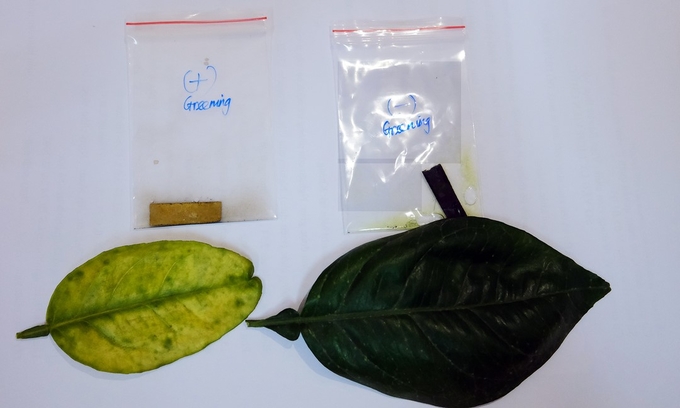
The rapid kit test for greening infected leaves was researched by PPRI (on the left is the infected sample). Photo: Bao Thang.
As one of 19 member units of the Vietnam Academy of Agricultural Sciences, in the 2018–2022 period, PPRI is annually assigned to perform 5-8 scientific and technological tasks at the national and ministerial levels and 15–18 provincial scientific tasks, with the total budget for research ranging from VND 25 to 28 billion/year.
The Institute has been taking part in international cooperation projects with organizations such as the Asian Vegetable Research and Development Center (AVRDC), the Australian Centre for International Agricultural Research (ACIAR), the Korea Partnership for Innovation of Agriculture (KOPIA), CIAT, and IAEA. The budget for international cooperation averaged VND 2–3 billion/year.
Besides difficulties in commercializing probiotics, PPRI also has problems with infrastructure. The system of greenhouses, net houses, and equipment for research work at the institute was degraded, not meeting the requirements of research and experiments. Funds allocated for salaries and administrative activities are not sufficient for the institute's activities.
On that basis, Director Nguyen Van Liem proposed to the Ministry of Agriculture and Rural Development eight groups of issues, including creating conditions for the direct assignment of basic and applied research tasks on new and emerging pests for the Institute to serve epidemic prevention work and export. In addition, a specific mechanism for the registration of probiotics for organic agricultural production was also mentioned.
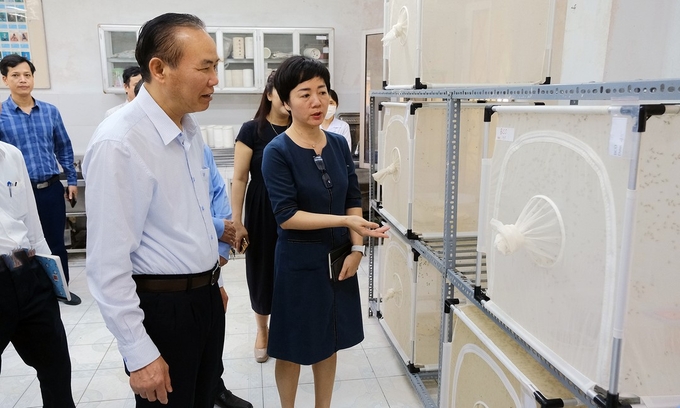
Deputy Minister Phung Duc Tien visited the fruit fly research lab at PPRI. Photo: Bao Thang.
Speaking at the working session, Deputy Director of the Plant Protection Research Institute Nguyen Thi Thu Huong highly appreciated the institute’s efforts in the past. However, for many reasons, both objective and subjective, the information about the Institute's research is not well known by farmers.
From the viewpoint of a management agency, the Deputy Director suggested that the institute focus on forecasting because the local plant protection force is still relatively thin and mainly uses human power instead of applying science and technology.
On that basis, the institute can build a database on harmful organisms, proceed with research on the resistance of pests and diseases, or treat harmful organisms after harvest. Since then, the Institute has advised the Department to issue local guidelines.
As an officer from PPRI, Director of Crop Production Department Nguyen Nhu Cuong shared that most people only seek information about PPRI when there is an epidemic. He expressed his agreement with Deputy Director Nguyen Thi Thu Huong that the Institute needs to strengthen communication with news agencies so that the Institute's research works are widely known.
In addition to the regular tasks assigned by the Ministry of Agriculture and Rural Development, the Director of the Crop Production Department "offered suggestions" to PPRI on the work of comprehensively investigating the situation of pests and diseases across the country, especially in the context of climate change and epidemics today. He said that this is an activity that took place many times in the 1970s and 1980s, and it is possible to conduct regular and continuous investigations on key crops or major pests.
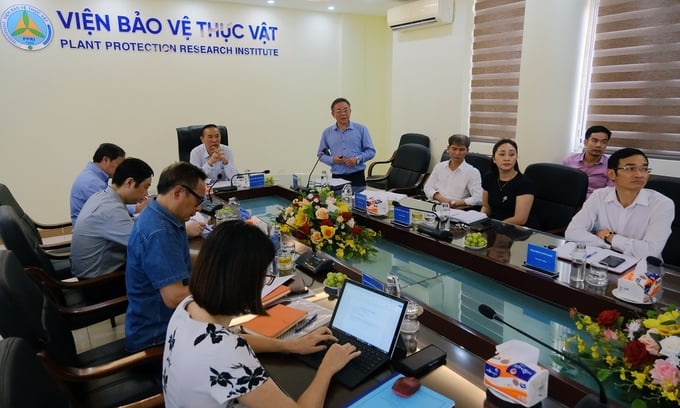
Director Nguyen Van Liem presented the PPRI’s results of activities in the past. Photo: Bao Thang.
Mr. Nguyen Hong Son, Director of the Vietnam Academy of Agricultural Sciences, noted to the Institute that the Central Highlands would soon become a key agricultural area, especially for fruit trees and industrial plants. Therefore, PPRI needs to build a special force for this area and even relocate the center from the Mekong Delta region to ensure forecasting work.
In addition, agriculture is strongly shifting towards ecological, organic, and circular practices. Therefore, Mr. Nguyen Hong Son suggested that the PPRI’s leaders organize research closely to the market, ensuring the spirit of "Open thinking- Fast action- Real results" that Minister Le Minh Hoan proposed.
Concluding the working session, Deputy Minister Phung Duc Tien emphasized the importance of scientific research in the field of plant protection. This effort helps the entire agricultural sector keep its development momentum throughout the past few years and, at the same time, minimizes worries for many years about diseases such as bacterial leaf blight, fall armyworm, etc.
Through many working sessions with the government as well as bilateral meetings with international partners, the Deputy Minister specified that the current period is very difficult when most countries have reduced aggregate demand. Therefore, the agricultural sector must have new directions for development, such as improving the quality of export products, promoting domestic consumption, and gradually turning production from brown to green.
"Scientists need to focus on researching products with high applicability, even worrying right from the start. We need to think in the direction of standing on our own two feet with scientific products," said the Deputy Minister.
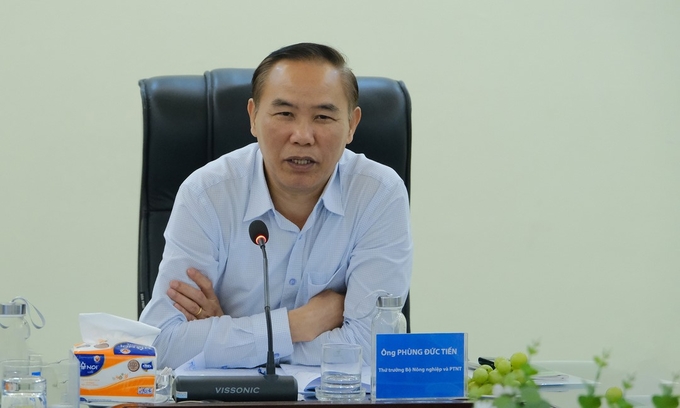
Deputy Minister Phung Duc Tien encouraged the PPRI’s staff to continue keeping their mind in their work, further enhancing their passion for scientific research. Photo: Bao Thang.
Calling for PPRI’s staff and researchers to attain an open mind in the 4.0 era, the Deputy Minister also set a number of tasks. With the Vietnam Institute of Agricultural Sciences, he suggested that the institute soon plan to review all 19 member institutes and allocate resources reasonable to each unit and suitable to each development stage.
Talking about the memories of the field trips, the Deputy Minister said that scientists need to "stand closer" to farmers, give them initial inspiration, and transfer the closest advances to the actual situation. It is noted that farmers are both beneficiaries and central targets of all plans and strategies.
Before representatives of agencies under the Ministry of Agriculture and Rural Development, the Deputy Minister suggested that all parties join hands to create an ecosystem, even building a pilot mechanism. At the same time, allocating resources to send staff to train in countries with similar conditions to Vietnam
Translated by Huyen Vu Thu
![Reducing emissions from rice fields: [2] Farmers’ commitment to the soil](https://t.ex-cdn.com/nongnghiepmoitruong.vn/608w/files/news/2025/05/05/dsc08881jpg-nongnghiep-140632.jpg)
(VAN) Clean rice cultivation model in Thuong Tan commune, Bac Tan Uyen district, is assisting local residents in achieving sustainable agriculture by substantially reducing costs, increasing productivity, and protecting the environment.

(VAN) At the conference to disseminate Resolution No. 68, AgriS introduced its digital agricultural ecosystem and reaffirmed its commitment to accompanying the Government in promoting private sector development and sustainable agriculture.

(VAN) 'Blue Ocean - Blue Foods' initiative is designed to restore marine ecosystems and establish sustainable livelihoods for local communities by cultivating a minimum of 1,000 hectares of cottonii seaweed in the first three years.
/2025/05/21/4642-3-112707_603.jpg)
(VAN) The V-SCOPE project has made direct contributions to three out of six pillars of the Comprehensive Strategic Partnership between Vietnam and Australia.

(VAN) Facing the threat of rabies spreading to the community, Gia Lai province urgently carries out measures to vaccinate dogs and cats on a large scale.

(VAN) Disease-free livestock farming not only protects livestock herds but also stabilizes production and livelihoods for many farmers in Tuyen Quang.

(VAN) Japan's grant aid project contributes to capacity building, promoting organic agricultural production, and fostering sustainable community development in Dong Thap province.